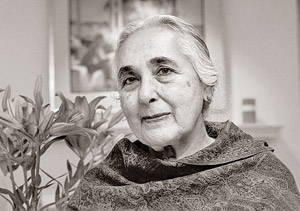Romila Thapar and politics of the present
Prof Nira Wickramasinghe
The entanglements and complicity between history as a discipline and
the nation continue to concern social scientists and historians.
Throughout her illustrious career Romila Thapar, Emeritus Professor of
History at Jawaharlal Nehru University, New Delhi has been deeply
engaged in unraveling this issue by pointing out the erasures and the
politics of attribution of significance in historical writings. Her work
has been analytically critical as well as historically grounded and has
helped us think about the reasons why certain facts are foregrounded,
why some stories are told and others are stifled.
 |
|
Romila Thapar -
profile in brief |
Graduated
from : Punjab University, India
Obtained Doctorate from: University of London
Worked at: As Professor of Ancient Indian History at
Jawaharlal Nehru Universiy, New Delhi
Author of: Asoka and the Decline of the Maurya (1963) A
History of India Ancient Indian Social History From Lineage to
State |
While her own work as a historian constantly strived to open up the
past, popular representations of the past seem to be pulling in the
opposite direction. In Sri Lanka too the kinds of linkages that are made
with the past in popular TV programs tend to marginalize many
communities and cultures that make up Sri Lankan society while
privileging the dominant state ideology based on the idea of a
foundational authentic and pure Sinhala Buddhist culture. It is no
surprise then that in post-war Tamil majority areas, texts such as the
Yalpana Vaipava Malai are increasingly being hailed as counter-evidence
to state readings of the islandís past.
Both perspectives that normalize certain memories and authenticate
claims for territory and control by referring to history need to be
questioned if our country is to forge ahead unhindered by violence.
Questioning accepted knowledge
In Sri Lanka, only a few historians have abandoned positivist
approaches and empiricist premises to offer a rereading of texts and
statements through interdisciplinary analyses on events that have long
been accepted as uncontested truths.
Popular perceptions, however, remain deeply influenced and shaped by
more accessible sources and by the knowledge imparted through a state
education curriculum which assumes a static past, which is of course the
bequest of colonial scholarship. Change is not impossible.
What is needed is not to replace one flawed vision by another but to
incite our citizenry and children to become curious about the world that
surrounds them and question accepted knowledge instead of memorizing one
version of it. Perhaps one must also encourage governments to set up
autonomous institutions to deal with school textbooks and the curriculum
so that regime change does not lead to an endless rewriting of texts to
suit political agendas and to ensure that the privatization of textbook
publication is subject to minimum quality control.
Thaparís work and interventions in the public sphere are an
invitation to think about standards of academic writing in our country
as well as the responsibility of the scholar towards society. Her career
is exemplary.
Thapar received her doctoral degree from London University in 1960
and returned to independent India to pursue her teaching and
scholarship. Her research on ancient India evolved new ways of reading
evidence from archaeology, mythology, literature, philosophy, ritual
texts, folklore, and other sources. The results yielded illuminating
perspectives on contemporary India as well as new comparative and
conceptual insights for historical studies more broadly. Today her works
are read by scholars from all disciplines in the social sciences and
humanities and have an appeal that transcends academic and national
boundaries.
Exploring memory politics
First published in 1966, Thaparís History of India, Vol.1, updated in
2002 as Early India has been in print ever since. Her subsequent books
secured her reputation as one of the most distinguished and productive
scholars in her field. Her most recent book, Somanatha: The Many Voices
of a History (2004), provided a new frame for understanding a pivotal
moment in Indian history. In 2004 the US Library of Congress appointed
her the first holder of the Kluge Chair in Countries and Cultures of the
South. In 2008 she was awarded the prestigious Kluge prize along with
Princeton University historian Peter Brown.
The Kluge award is often referred to as the American Nobel Prize, as
it covers the human sciences for which there are no Nobel awards.
In the History of India, Vol. I (published in 1966), Thapar adopted a
social science approach as she moved beyond political/dynastic history
and succeeded in incorporating a variety of human activities in her
narrative, from the economic, social, technological, religious to the
literary and artistic. But she never remained in the abstract and
continued to search for new evidence on early India in archaeological
finds, works in Persian and Arabic and numismatics. Thaparís work is
truly interdisciplinary and comparative, an example of boundary breaking
between disciplines of the humanities and social sciences as well as the
literary genre.
She belongs to the generation of Indian historians who waged war
against communal histories through their questioning of communal
stereotypes and their championing of a secular national history. Her
approach has moved from an earlier concern with facticity - that is
battling facts with facts - to an exploration of politics of memory.
What is remembered or forgotten takes precedence over the question of
whether an event happened or not. Through her often courageous stands on
issues concerning identities and traditions Thapar is the epitomy of the
intellectual who is, as the French say, Ďengageí.
Through her work and extensive publications she has been recognized
and honoured worldwide as a scholar of singular distinction. Reading
Thapar can help us transcend the limits that the politics of the present
impose on us.
The writer is Chair in Modern South
Asian Studies, Leiden University, Netherlands
(Prof Romila
Thapar will deliver the 11th Neelan Tiruchelvam Memorial Lecture at the
Sri Lanka Foundation Institute Auditorium on August 1 at 6.00 pm)
|



